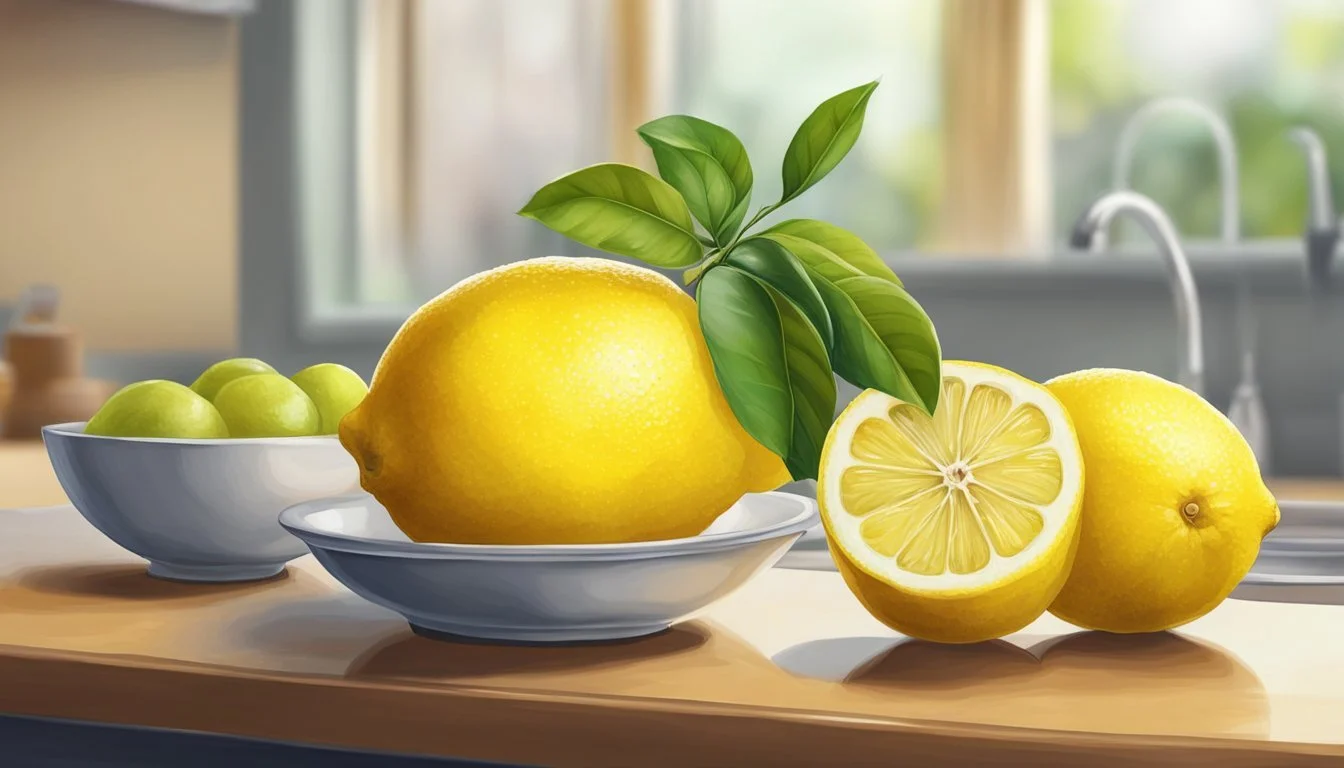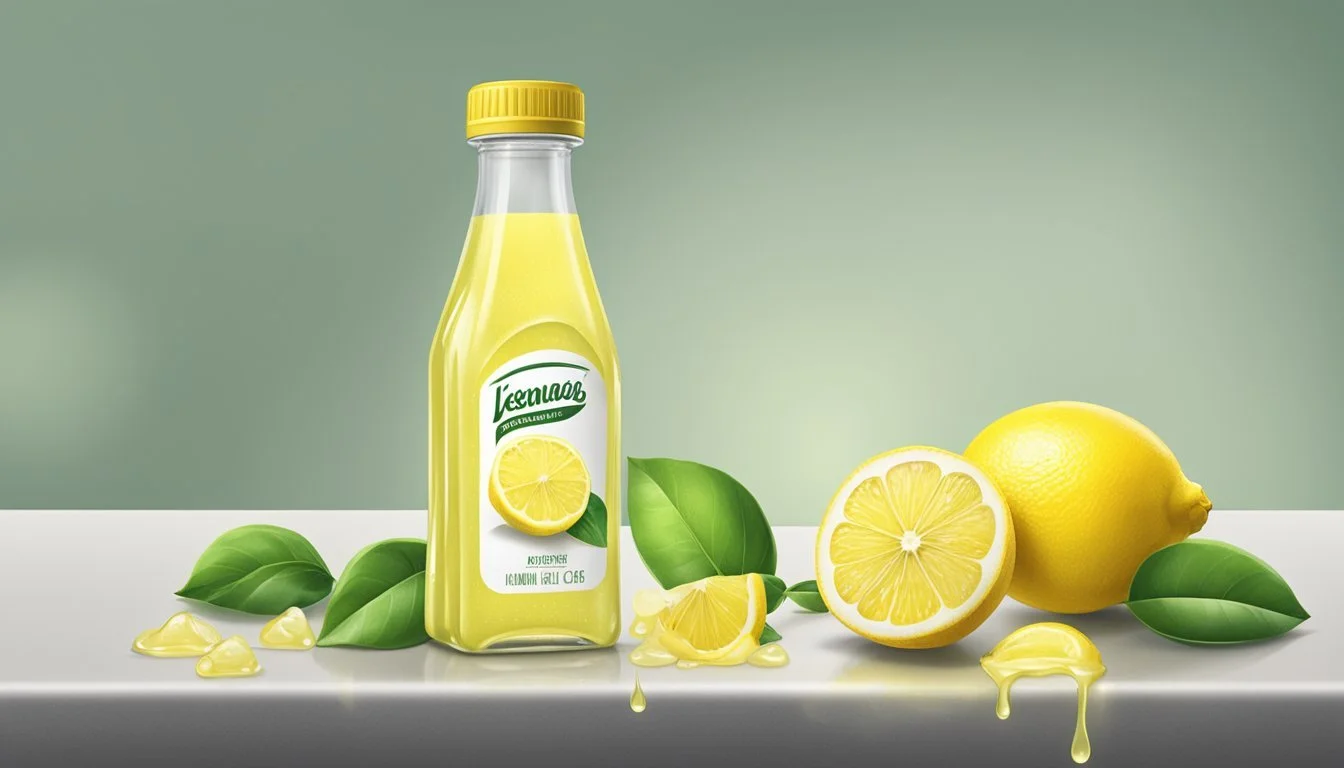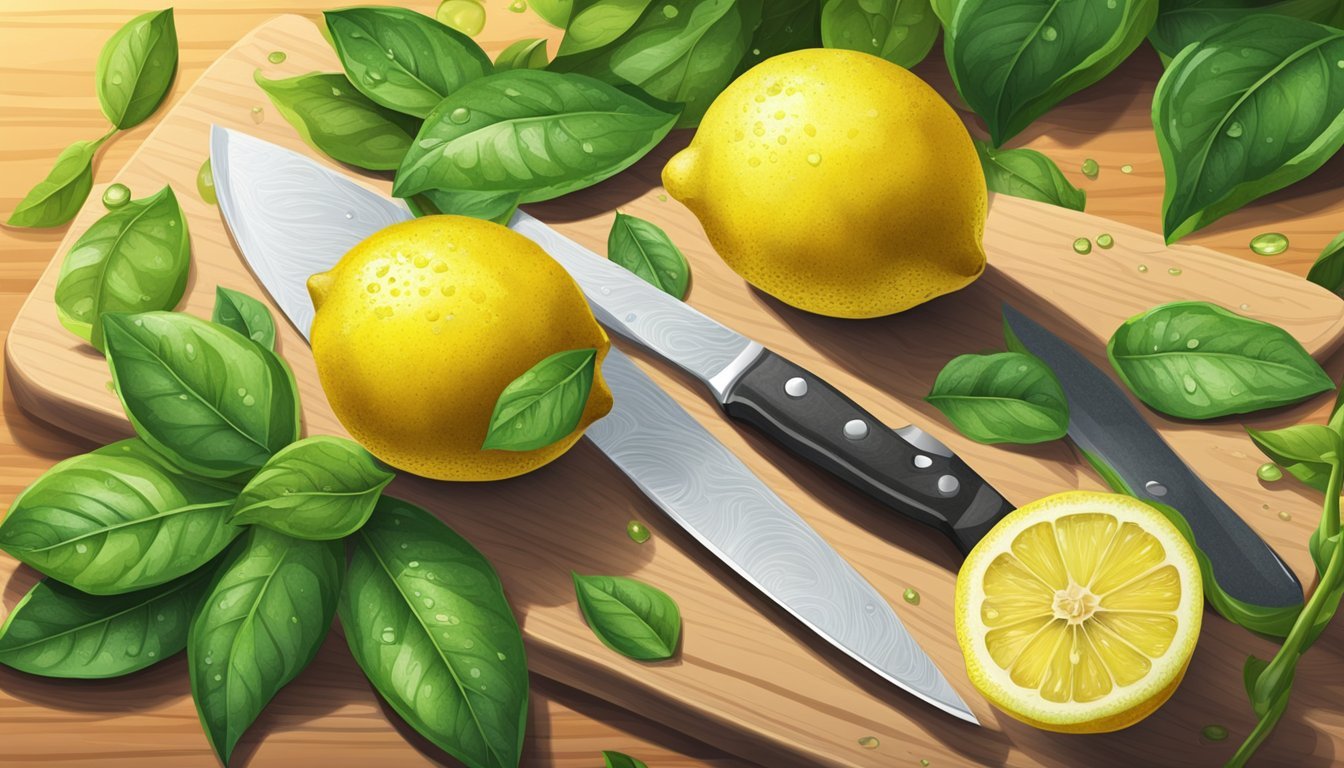Does Lemon Juice Go Bad?
Understanding Shelf Life and Spoilage Signs
Lemon juice, recognized for its vibrant flavor and preservative qualities due to its high acid content, is a staple in kitchens around the world. While it's often presumed that its acidic nature wards off spoilage, the reality is that lemon juice can, indeed, go bad. Consumers and chefs alike rely on its zesty punch to enhance beverages, marinate meats, or add a tangy twist to dressings and sauces, which makes understanding its shelf life and signs of spoilage important.
Over time, both store-bought and freshly squeezed lemon juice can deteriorate in quality. This is marked by changes in taste, color, and smell. Bottled lemon juice contains preservatives which extend its shelf life, yet it remains susceptible to spoilage particularly after opening. Fresh lemon juice lacks these preservatives and therefore has a much shorter shelf life.
Proper storage is pivotal in preserving the quality of lemon juice. It should be kept in an airtight container and refrigerated to slow down the degradation process. Bacterial growth, yeast, and mold can also cause lemon juice to spoil, which underscores the significance of adhering to storage guidelines to maintain its freshness and safety for consumption.
The Basics of Lemon Juice
Lemon juice is a commonly used citrus extract that varies depending on its source and processing. This section explores the essential characteristics of lemon juice and its different forms, namely fresh lemon juice and store-bought bottled variations.
Understanding Lemon Juice
Lemon juice is derived from fresh lemons, which are a rich source of vitamin C and other nutrients. It contains a high concentration of citric acid, a natural preservative that contributes to its tangy flavor. Fresh lemon juice refers to the liquid extracted directly from the fruit, typically by hand or with a juicer. This juice contains no additives and boasts the full spectrum of lemon's natural benefits, including a potent dose of vitamin C. The freshness factor is critical here, as freshly squeezed lemon juice has a lively, vibrant taste that is highly valued in both culinary and beverage applications.
Types of Lemon Juice
There are two primary types of lemon juice available:
Freshly Squeezed Lemon Juice:
Made from fresh lemons.
Lacks preservatives, requiring refrigeration and quick usage.
Commercially produced and sold in stores.
Often contains preservatives that extend its shelf life.
Can be stored unopened in the pantry for approximately a year and up to six months in the refrigerator once opened.
Whether one opts for freshly squeezed lemon juice or the convenience of store-bought bottled juice, understanding these fundamentals is crucial for proper use and storage to ensure the lemon juice maintains its flavor and nutritive value.
Shelf Life and Preservation
Understanding the shelf life of lemon juice and the factors that contribute to its preservation is critical for ensuring its freshness and safety for use.
Factors Affecting Lemon Juice Shelf Life
The shelf life of lemon juice is influenced by several key components, including whether it's freshly squeezed or commercially produced with preservatives. Freshly squeezed lemon juice typically lasts 2-4 days in the refrigerator, while the addition of preservatives can extend the shelf life of commercial lemon juice to about 6-12 months when unopened and stored in the pantry. Once opened, commercial lemon juice lasts around 6 months in the refrigerator if properly stored.
Storing lemon juice in an airtight container can significantly reduce exposure to air and, consequently, oxidation, which can degrade the quality of the juice. Pasteurized lemon juice, commonly found in stores, often has a longer shelf life due to the elimination of microorganisms that can cause spoilage. The printed best-by or expiration date provides a guideline, but proper storage practices such as keeping the juice away from light and heat sources can further ensure preservation.
Spotting Spoiled Lemon Juice
To determine if lemon juice has spoiled, one should look for certain signs:
Discoloration: Any change from its natural pale-yellow color could indicate spoilage.
Off odors: A sour or unpleasant smell distinct from its citrusy freshness is a sure sign that the lemon juice should not be consumed.
Changes in taste: If the lemon juice tastes off or has a fizzy or fermented flavor, it has likely gone bad.
By closely monitoring these indicators and adhering to proper storage methods, one can prevent consumption of spoiled lemon juice.
Storage Solutions
To maximize the shelf life of lemon juice and retain its quality, proper storage solutions are crucial. Employing the right refrigeration methods and freezing techniques can greatly extend the longevity of lemon juice, whether it's freshly squeezed or commercially bottled.
Refrigeration Methods
Storing lemon juice in the refrigerator is essential for keeping it fresh. An airtight container should always be used to minimize exposure to air, which can accelerate spoilage. For best results, freshly squeezed lemon juice should be kept in the fridge and consumed within a few days. Commercially bottled lemon juice, while longer-lasting, also benefits from refrigeration and should be used within the manufacturer's recommended time frame after opening.
Bottled Lemon Juice: Store in the refrigerator; consume by the manufacturer's use-by date.
Fresh Lemon Juice: Store in an airtight container in the refrigerator; use within 2-3 days.
Freezing Techniques
Freezing lemon juice can significantly extend its shelf life, making it a convenient option for long-term storage. Lemon juice frozen in ice cube trays can be a flexible and easy way to preserve smaller portions. Once frozen, the cubes should be transferred to a sealed bag or airtight container to prevent freezer burn. Frozen lemon juice can be used in cooking and baking or thawed for use in beverages.
Freeze in Ice Cube Trays: Pour lemon juice into trays, freeze, then store cubes in an airtight container.
Usage: Use frozen lemon juice cubes directly in recipes or thaw for use as needed.
By adhering to these storage solutions, one can ensure that lemon juice maintains its quality and remains safe for consumption much longer than it would if left at room temperature or improperly stored.
Food Safety and Spoilage Indicators
When considering the quality and safety of lemon juice, recognizing spoilage signs and understanding the health implications of consuming spoiled juice are essential.
Physical Signs of Deterioration
Detecting spoilage in lemon juice primarily involves observing changes in color, smell, and taste. Fresh lemon juice typically has a clear, pale yellow hue, but a sign of spoilage is a noticeable discoloration such as a darker, brownish shade. Mold growth may appear as well, which is visible as fuzzy spots on the surface of the juice. An off odor is another reliable indicator; the juice should smell citrusy and fresh, but if it develops a sour or fermented smell, it is no longer safe. Lastly, if the taste has changed significantly and becomes unpleasantly sour beyond the natural tartness of lemons, this indicates that it's time to discard the juice.
Health Risks of Consuming Bad Lemon Juice
Consuming lemon juice that has gone bad poses health risks due to bacterial growth and the potential food poisoning symptoms that may follow. These symptoms can include nausea, vomiting, and diarrhea. Bacteria such as E. coli or Salmonella, which are often undetectable by taste or smell, could proliferate, especially if the juice has not been properly refrigerated. The safety measure here is to err on the side of caution; it's better to discard any lemon juice that shows signs of spoilage to mitigate risk and ensure food safety. While fresh lemon juice contains health benefits like vitamin C and antioxidants, these diminish with spoilage, negating the nutritional advantage of consuming the juice.
Maximizing Lemon Juice Quality
Maintaining the quality of lemon juice is crucial for preserving its freshness and acidity, which are essential for uses such as making lemonade. Proper handling and storage extend its shelf life, ensuring that the zesty flavor of fresh lemon is retained as long as possible.
Lemon Juice Handling
To maintain lemon juice quality, one should handle it with care from the moment of juicing. It's vital to perform a taste test immediately after juicing to assess its initial quality. This can be done by sampling a small amount to detect any off flavors. If using a juicer, ensure it is clean to avoid contamination that can affect taste and freshness. It's also important to minimize exposure to light and air, which can degrade the quality due to oxidation. Finally, transfer the lemon juice into an airtight container to protect it from these elements.
Extending Lemon Juice Freshness
There are several methods to extend the freshness of lemon juice:
Refrigeration: Always store lemon juice in the refrigerator within a couple of hours of juicing. Fresh lemon juice should last 2-3 days when refrigerated.
Freezing: For longer storage, pour the lemon juice into an ice cube tray and freeze. Use these cubes as needed for added convenience.
Dilution: When planning to freeze lemon juice, combining it with an equal part of water helps in preserving its acidity levels suitable for making lemonade.
Alternative Citrus: While lemon juice is preferred for its unique flavor, in some cases, lime juice or orange juice can be used as substitutes. Each has its own distinct taste profile and acidity that can be suitable for different recipes.
Odor Prevention: To ensure lemon juice does not absorb odors, use airtight containers and keep it away from strong-smelling foods within the refrigerator.
Storing lemon juice properly and handling it with care can significantly improve its longevity, allowing one to enjoy the invigorating zest that only fresh lemon can offer.
Practical Tips and Alternatives
When it comes to lemon juice, understanding its shelf life and knowing how to utilize any surplus or what to substitute in its absence are essential.
Utilizing Leftover Lemon Juice
Freezing for Longevity: If one has leftover lemon juice, they can freeze the excess to extend its usability. Pouring the lemon juice into ice cube trays and freezing it not only prevents waste but also provides portion-sized lemon juice for future use. Brands like Jif and ReaLemon are commonly found in stores, often containing preservatives to prolong shelf life. However, fresh lemon juice freezes well and can be a more natural option.
Cooking and Baking: Leftover lemon juice serves well in various culinary applications. Marinades for meat or as a bright addition to salad dressings benefit from the acidity and flavor of lemon juice. Bakers can incorporate lemon juice into cakes and icings, while home chefs might add a splash to finish off a sauce or a dish to enhance flavor.
Lemon Juice Substitutes
For Cooking and Baking: When in need of a substitute for lemon juice, one can use other citrus juices such as lime or orange, which provide a similar level of acidity and a complementary flavor. Vinegar is also a substitute, offering the necessary acidity, though the flavor profile will differ.
Lime Juice: A close substitute with similar tang and brightness.
Orange Juice: Sweeter, less tart, but can provide the required acidity in a pinch.
White Vinegar: A clean, sharp acidity though with a less fruity flavor.
Apple Cider Vinegar: Milder with a slight apple flavor, good for dressings and marinades.
For Health and Beauty: Lemon juice's antibacterial properties are valued in both health remedies and beauty routines. If unavailable, substitutes like tea tree oil, which has similar antibacterial properties, or witch hazel, known for its skin-soothing benefits, can be considered.
Recognizing Quality and Freshness
When it comes to lemon juice, fresh is synonymous with quality. Whether one is examining a freshly squeezed batch or commercially packaged lemon juice, key attributes such as color, smell, and taste are paramount in assessing its freshness and quality.
Assessment Techniques
Visual Inspection: Lemon juice should possess a vibrant, clear yellow color. Any discoloration may indicate spoilage, with brownish or greenish hues suggesting oxidation or contamination.
Textural Clues: High-quality fresh lemon juice should be free from excessive sedimentation. While some pulp is natural, substantial sediment at the bottom may signal degradation.
Olfactory Evaluation: Fresh lemon juice will have a bright, citrusy aroma. An off smell is often the first indicator of spoilage. If the juice emits a sour, unpleasant, or yeast-like smell, it may no longer be fresh.
Taste Test: Fresh lemon juice has a characteristic tart, bright taste. Any bitterness or off tastes can denote spoilage and poor quality.
Commercial Lemon Juice Considerations
Shelf Life: Commercially packaged lemon juice often includes preservatives, extending its shelf life. Unopened bottles can last several months past their printed date if stored properly. Once opened, it's recommended to use within 6 months for optimal freshness.
Storage Recommendations:
Keep unopened commercial lemon juice in a cool, dark place.
After opening, refrigerate to maintain quality.
Label Integrity: Trustworthy brands will provide storage instructions and a best-by date. Adherence to these details helps maintain the commercial lemon juice's freshness and quality.
Troubleshooting and FAQs
This section offers insight into common signs of spoilage and answers to frequent queries regarding the shelf life and condition of lemon juice to help ensure its optimal use.
Common Lemon Juice Questions
How can one tell if lemon juice has gone bad?
Signs of degradation: Look for discoloration, an off odor, or any changes in taste. The presence of mold or excessive fermentation, evidenced by bubbling, is a clear indication that the lemon juice should not be consumed.
Duration and best-by date: Freshly squeezed lemon juice has a fridge shelf life of 2 to 4 weeks, while commercially packaged lemon juice lasts significantly longer due to preservatives. Always check the best-by date, but remember that lemon juice can still go bad before this date if not stored properly.
Addressing Lemon Juice Concerns
What causes lemon juice to degrade?
Oxidation process: Exposure to air can cause oxidation, leading to a loss in quality.
Contamination: Bacteria or mold growth from external sources or improper handling can contribute to faster spoilage.
Is it safe to consume expired lemon juice?
Expired lemon juice: Consuming lemon juice that has surpassed the printed expiration or best-by date may come with risks, especially if signs of spoilage are evident. While it might not be harmful if only recently expired, it's best to err on the side of caution and avoid ingestion.
Conclusion
Lemon juice, whether freshly squeezed or commercially packaged, does have a shelf life and can go bad. Signs of spoilage typically include:
Discoloration: Lemon juice losing its vibrant yellow color.
Odor: Development of an off or unpleasant smell.
Taste: Altered flavor profile, such as excessive sourness, funkiness, or even tastelessness.
To preserve its freshness, lemon juice should be stored properly:
Refrigerator: Keeping it in a sealed bottle or container.
Freezing: Freezing in an ice cube tray for extended use.
Shelf life varies significantly between homemade and preserved lemon juice:
Commercially packaged lemon juice (with preservatives) can last up to a year.
Freshly squeezed juice is best used within two to eight weeks.
Consumers can take steps to extend the shelf life of lemon juice, like mixing it with water and freezing it, ensuring it remains useful for culinary or household applications. However, they should always be vigilant for signs of spoilage and discard any lemon juice that shows these indications to avoid potential health risks.








